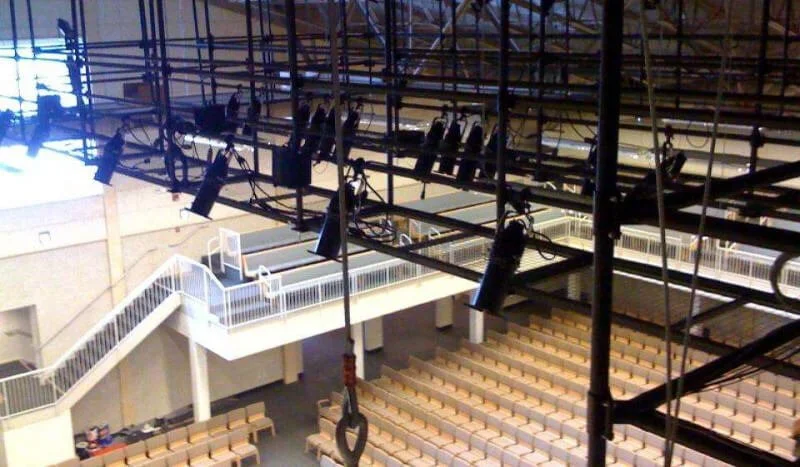Confronting My Fear of Heights in the Theatre
by Chris Peterson
I never thought I had a fear of heights. I had been on rollercoasters, hiked up cliffsides, and even flown in small planes without a second thought. But it wasn’t until I found myself perched on a narrow platform high above a college theatre stage, trying to focus a lighting instrument during tech week, that I realized something was very wrong. My legs went stiff. My palms were sweating so badly that I couldn’t grip the wrench. I wasn’t scared. I was terrified. And I still had three more lights to adjust.
It turns out I’m not alone. A reader reached out and asked about this. That’s what sparked this article. I realized how rarely we talk about the physical fears that come with working in theatre. We talk about performance anxiety, stage fright, creative blocks, and burnout. But not the sheer, gut-level fear that can take over when you’re ten feet up on a ladder, or stepping onto a suspended platform, or climbing into a catwalk for the first time.
In theatre, we ask people to be bold. To climb. To fly. To build and hang and perform from the rafters. It doesn’t matter whether you're a lighting designer, a scenic painter, a carpenter, a stage manager, or an actor. At some point, someone is going to ask you to go up there. For those of us who aren’t great with heights, it can feel like the ground itself is being pulled away.
I remember a professor casually tossing me a harness one afternoon and saying, “You’ll get used to it.” He meant it kindly, but I didn’t get used to it. I learned how to function through it. I learned how to breathe, to double-check every clip and latch, to lean into the structure for support. I learned to tell the difference between healthy caution and paralyzing fear. I learned to speak up when something felt unsafe, even when I worried it might make me seem weak or dramatic. That was a lesson I needed far more than the lighting plot.
The truth is, theatre teaches us all kinds of things we don’t expect. When I enrolled, I thought I was going to become a better actor, or maybe learn how to direct. I didn’t think I’d spend hours up in the grid, trying to talk myself through an anxiety attack while still getting the cue right. I didn’t think I’d have to wrestle with something as primal as my body’s reaction to gravity. But theatre, at its best, makes space for that kind of challenge. It doesn’t just demand that we be brave. It gives us the tools to grow into that bravery.
If you’re someone who loves theatre but struggles with heights, here’s what I’ll tell you. You’re not alone. It doesn’t make you less capable, less artistic, or less valuable to your team. There are ways to contribute that don’t involve climbing a ladder. And when you do have to go up there, take your time. Ask for help. Use the safety gear. Breathe. And don’t be afraid to say, “Not today.” That boundary is just as important as your talent.
I still get nervous when I’m high above the stage. That fear hasn’t magically gone away. But now I know how to manage it. I’ve climbed ladders, walked catwalks, focused lights, and even performed on tall platforms. I’ve done it scared. And that counts. That matters.
Theatre will always be about storytelling, but it’s also about transformation. Sometimes the biggest role we take on isn’t one written in the script. Sometimes it’s the role of becoming someone who shows up, fear and all, and still finds a way to shine the light.
